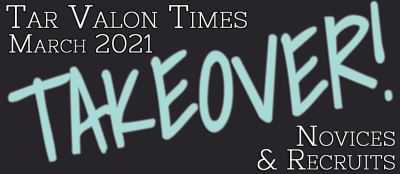TVTT Novice/Recruit Edition - Heart Health Month
Author: Atane Valthon
Published: March 2 2021 Tar Valon Times Blog Link
Throughout the year, there are months that are dedicated — both in the United States and throughout the world — to advocacy for many different causes. Here at the Tar Valon Times, we would like to highlight some of these months. Many that we will be focusing on will center around health, while others may center around societal advocacy. As we close out February, we bring you one of the month’s focuses in the United States and in Britain, which is Heart Health. (This article has several footnotes for your reference and more information.)
Personally, being mindful of the health of my own heart is important to me; my paternal grandmother, one of my father’s sisters, and my father himself have had a condition called atrial fibrillation. Atrial fibrillation is an irregular and often rapid heart rate, which can increase risk of strokes, heart failure, and other cardiac conditions. Sometimes medicine can help treat symptoms, but in other situations pacemakers or other medical procedures are necessary.[1] Also, six months ago one of my good friends, age 37, had a severe heart attack. One hundred percent of his Left Anterior Descending artery was blocked, one which is typically called a widowmaker.[2] Thankfully, he survived, but there are mental consequences as well: depression and anxiety among them. So, those are my experiences that center around heart issues, and I would suspect that other members of the site have similar stories.
The two organizations that I am getting the information in this article are the American Heart Association (AHA) and the British Heart Foundation (BHF). Both of these organizations are advocacy groups: they provide public relations campaigns, particularly during the month of February. Another way they provide knowledge is through the collection and release of statistics about cardiovascular and circulatory diseases. Perhaps the most substantial way the American Heart Association and the British Heart Foundation contribute is through the funding they provide to researchers. What has the AHA done with their funding? The AHA “has funded 14 Nobel Prize winners and several important medical breakthroughs, including techniques and standards for CPR, the first artificial heart valve, implantable pacemakers, cholesterol inhibitors, microsurgery and drug-coated stents.” [3] The BHF has conducted research in the areas of Congenital Heart Problems, Heart Rhythm Problems, Heart Failure, Heart Attacks, Heart Valve Disease, and Hypertrophic Cardiomyopathy. [4]
What does heart disease look like, “by the numbers?” Well, in the UK, there are 7.6 million people living with heart and circulatory diseases; 450 people die each day from a heart or circulatory heart disease; there are more than 100,000 people admitted to hospital each year due to heart attacks; and on average, there is one stroke each minute.[5] In the USA, in 2017, Cardiovascular Disease accounted for 868,662 deaths; while in 2018, Strokes accounted for about one of every 19 deaths; while any-mention cardiac arrest mortality was 393,872.[6]
So, how about some facts and myths about heart health? Fact: A Broken Heart is a legitimate medical condition (It’s also called Takotsubo Cardiomyopathy). Fact: Poor Oral Health increases heart disease risk. Myth: Exercise and Diet are my only solution to better heart health. In fact, lowering stress levels and increasing sleep quality greatly impact cardiovascular health and wellness.[7]
Taking care of one’s heart is important, and can impact our health overall; of course, we also know that other health conditions can affect heart health. Here at the Tar Valon Times, we want to advocate for being mindful of the health of our members. As a community, as a family, we want the best for one another. One of the ways we can care for the heart, and one of my favorite pastimes, is listening to music.[8] So, as Roxette sang, and DHT reminded us, “Listen to Your Heart.”
[1] Cleveland Clinic
[2] Healthline
[3] Heart Fact Sheet
[4] BHF
[5] HBF Statistics
[6] Heart.Org
[7] Active Beat
[8] Health at Harvard
